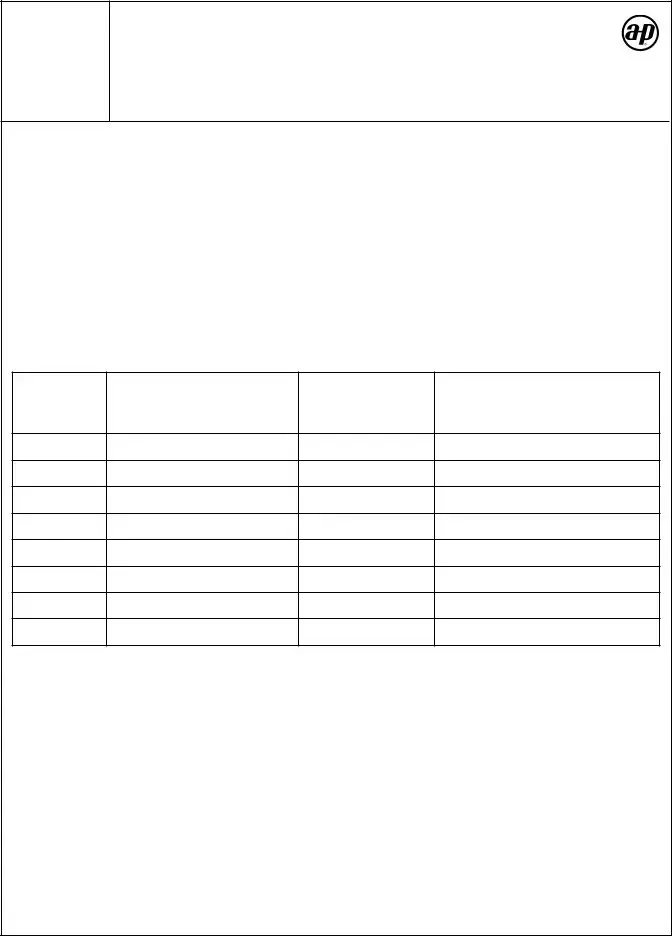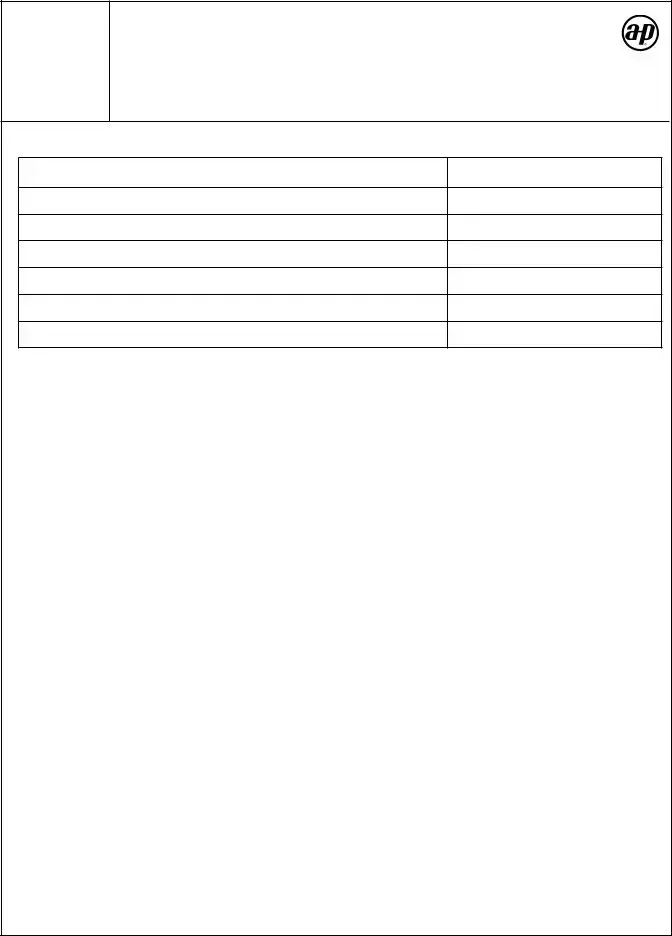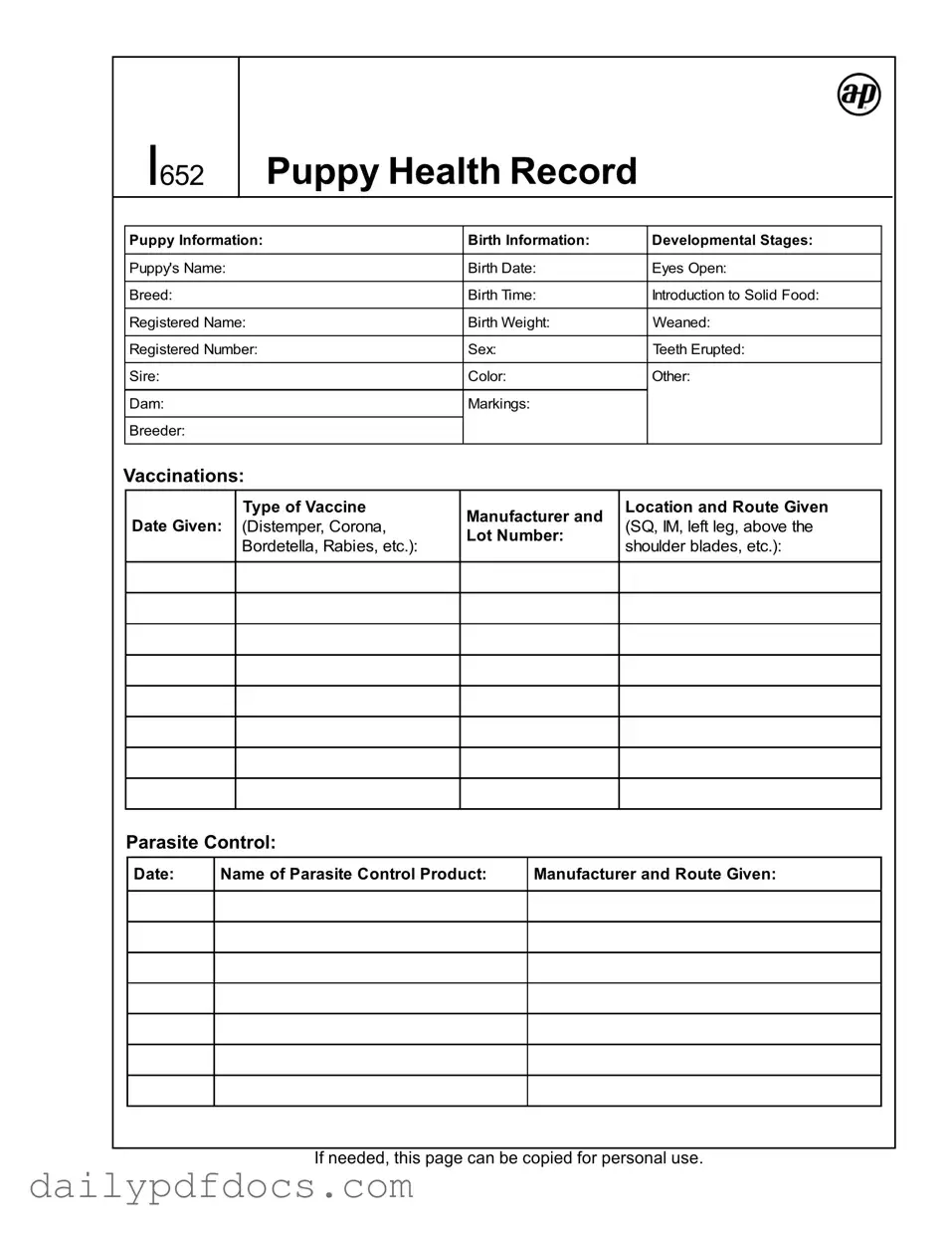Fill Your Puppy Health Record Form
The Puppy Health Record form serves as a vital tool for tracking the health and developmental milestones of a puppy from birth through its early life stages. This comprehensive document includes essential information such as the puppy's name, breed, and birth details, which help establish a clear identity for the animal. It also captures key developmental stages, including when the puppy's eyes open, when it begins to eat solid food, and when it is weaned. Vaccination records are meticulously documented, detailing the types of vaccines administered, their manufacturers, and the specific dates they were given. Additionally, the form tracks parasite control measures, ensuring that the puppy receives the necessary treatments to maintain its health. Important examinations and procedures performed by either the owner or a veterinarian are noted, providing a thorough history of the puppy’s medical care. Furthermore, a schedule of events outlines significant milestones from birth to spaying or neutering, guiding owners through the critical early months of their puppy's life. This record not only aids in the health management of the puppy but also serves as a reference for future veterinary visits and care decisions.
Find Other Documents
Ms Word Chart - Column 3: Ensure examples are varied to provide comprehensive coverage.
For those navigating legal agreements, a well-crafted Non-disclosure Agreement template can provide clarity and structure, ensuring that sensitive information remains protected while fostering trust in business relationships.
Return to Work Note From Doctor - Inmates will receive guidance on the work release process after form submission.
Wage and Tax Statement - Taxpayers should verify that their W-2 matches their year-end pay stubs.
Common Questions
What is the purpose of the Puppy Health Record form?
The Puppy Health Record form serves as a comprehensive tool to track the health and development of a puppy from birth until spaying or neutering. It helps owners and veterinarians document important milestones, vaccinations, and medical procedures. This record ensures that all necessary health information is easily accessible, promoting better care and management of the puppy's health.
What information is included in the Puppy Health Record?
The form includes various sections that capture essential details about the puppy. This encompasses the puppy's name, birth date, breed, and weight, as well as details about its parents. Additionally, it records vaccination dates, types of vaccines administered, and parasite control measures. The form also outlines developmental stages and scheduled events from birth to spaying or neutering, ensuring that all critical health milestones are noted.
How often should vaccinations be given according to the form?
The Puppy Health Record form suggests that vaccinations should ideally be administered at three-week intervals. This schedule helps ensure that the puppy receives timely protection against common diseases. The specific types of vaccines, such as Distemper or Bordetella, are also noted to provide a clear vaccination history for the puppy.
What is the significance of tracking developmental stages?
Tracking developmental stages is crucial for understanding a puppy's growth and health. The form outlines key milestones, such as when the puppy's eyes open, when it is introduced to solid food, and when it should be weaned. Monitoring these stages helps owners recognize any potential issues early on and ensures that the puppy receives appropriate care at each phase of its development.
How can owners use the Puppy Health Record for parasite control?
The Puppy Health Record includes a section dedicated to parasite control, where owners can log the date and type of parasite control products used. This is important because it helps keep track of treatments for common parasites, ensuring the puppy remains healthy. The form also provides guidance on the timing of deworming and heartworm medication, which can vary based on the product used and the time of year.
Can the Puppy Health Record be copied for personal use?
Yes, the Puppy Health Record form is designed to be user-friendly, and it can be copied for personal use. This allows owners to maintain multiple records for different puppies or to keep a backup of important health information. Having additional copies ensures that owners can easily manage and update their puppy’s health records as needed.
What should be done if a vaccination is missed?
If a vaccination is missed, it is important to consult with a veterinarian as soon as possible. The veterinarian can provide guidance on how to proceed, which may include rescheduling the missed vaccination or adjusting the vaccination schedule. Keeping accurate records on the Puppy Health Record form will help facilitate this discussion and ensure that the puppy remains protected against preventable diseases.
Why is it important to have a veterinarian perform examinations?
Regular examinations by a veterinarian are essential for the overall health and well-being of a puppy. These check-ups allow for professional assessments of the puppy’s growth, development, and any potential health concerns. The Puppy Health Record form includes a section for documenting findings and comments from these examinations, which can be invaluable for tracking the puppy's health over time.
Preview - Puppy Health Record Form

I652
PuppyHealthRecord
Puppy Information: |
Birth Information: |
DevelopmentalStages: |
|
|
|
Puppy's Name: |
BirthDate: |
Eyes Open: |
|
|
|
Breed: |
BirthTime: |
Introductionto Solid Food: |
|
|
|
Registered Name: |
BirthWeight: |
Weaned: |
|
|
|
Registered Num er: |
Sex: |
TeethErupted: |
|
|
|
Sire: |
Color: |
Other: |
|
|
|
Dam: |
Markings: |
|
|
|
|
Breeder: |
|
|
|
|
|
Vaccinations:
Date Given:
Type of Vaccine (Distemper,Corona, Bordetella,Ra ies,etc.):
Manufacturer and ot Number:
ocation and Route Given (SQ,IM,leftleg,a ove the shoulder lades,etc.):
ParasiteControl:
Date: |
Name of Parasite ControlProduct: |
Manufacturer and Route Given: |
|
|
|
|
|
|
|
|
|
|
|
|
|
|
|
|
|
|
|
|
|
|
|
|
Ifneeded,thispagecanbecopiedforpersonaluse.

I652
PuppyHealthRecord PAGE 2
ExaminationsorProceduresPerformedbyOwnerorVeterinarian:
Date: |
Findings and Comments: |
|
|
Owner or Veterinarian Initials:
Schedule of Events fromBirthtoSpayor Neuter
*Each vaccination should ideallybegivenatthree weekintervals.
**Thetimetobeginheart- worm medication can vary dependingontheproduct andtimeofyear.
***The
SeepagesA622andA905for parasitecontrolandvaccination suggestions.
Events |
Age |
Date |
|
|
|
Birthdate |
Day1 |
|
|
|
|
Dewclawremovaland taildock |
|
|
|
|
|
2 weeks |
|
|
|
|
|
Toenailtrim |
2 weeks |
|
|
|
|
Solid food introduction |
3 weeks |
|
|
|
|
4 weeks |
|
|
|
|
|
Toenailtrim |
5 weeks |
|
|
|
|
1stcar trip |
6 weeks |
|
|
|
|
1stshot |
|
|
|
|
|
Physicalexamination yvet |
|
|
|
|
|
6 weeks |
|
|
|
|
|
Weaning |
|
|
|
|
|
Move to cages |
7 weeks |
|
|
|
|
8 weeks |
|
|
|
|
|
Toenailtrim |
9 weeks |
|
|
|
|
2nd Shot* |
|
|
|
|
|
3rd Shot |
|
|
|
|
|
Beginheartwormmedication** |
|
|
|
|
|
12 weeks |
|
|
|
|
|
4thand finalshots |
|
|
|
|
|
Spayor neuter |
|
|
|
|
|
Ifneeded,thispagecanbecopiedforpersonaluse.
Similar forms
- Veterinary Health Record: Similar to the Puppy Health Record, this document tracks a pet's health history, including vaccinations, treatments, and any medical concerns noted by the veterinarian.
- Pet Adoption Record: This document provides details about a pet's background, including previous owners, health information, and any special needs, much like the Puppy Health Record outlines a puppy's early life.
- Pet Insurance Policy: Just as the Puppy Health Record documents health events, an insurance policy includes coverage details for medical treatments and vaccinations, helping pet owners manage costs.
- Breeder's Certificate: This certificate provides information about the puppy’s lineage and health, similar to how the Puppy Health Record includes details about the puppy’s parents and breeding.
- Microchip Registration Form: Like the Puppy Health Record, this form documents important identification information for the pet, ensuring they can be returned to their owner if lost.
- Operating Agreement: The Ohio PDF Forms provides essential templates for drafting an Operating Agreement, detailing the management structure and operational procedures of an LLC, ensuring clarity among members regarding their rights and responsibilities.
- Pet Care Plan: This plan outlines the care schedule, including vaccinations and check-ups, akin to the timeline of events from the Puppy Health Record that guides owners on their puppy’s needs.
- Training Log: Similar to the Puppy Health Record, a training log tracks a pet's progress in training sessions, noting milestones and behaviors to monitor development.
- Pet Travel Health Certificate: This document is required for traveling pets and includes vaccination records, paralleling the Puppy Health Record's emphasis on vaccinations and health status.
- Grooming Record: Like the Puppy Health Record, a grooming record tracks grooming sessions, including dates and services performed, ensuring a pet's hygiene and appearance are maintained.
Misconceptions
Misconceptions about the Puppy Health Record form can lead to confusion among pet owners. Here are four common misconceptions and clarifications regarding the form:
- The form is only for veterinarians. Many people believe that the Puppy Health Record is solely for use by veterinarians. In reality, this form is designed for both pet owners and veterinarians. Owners can track their puppy's health information and share it with their vet during visits.
- All vaccinations are given at the same time. Some assume that all vaccinations can be administered in one visit. However, the recommended schedule suggests that vaccinations should ideally be spaced out at three-week intervals to ensure the puppy's immune system can respond effectively.
- Parasite control is not necessary. There is a misconception that parasite control is optional. In fact, regular parasite control is crucial for a puppy's health. The form emphasizes the importance of using appropriate products at the recommended times to protect against common parasites.
- Health records are not important after the puppy is grown. Many owners think that once their puppy matures, the health record is no longer needed. This is misleading. Maintaining a comprehensive health record throughout the dog's life can help identify health issues early and provide a complete medical history for future veterinary care.
File Attributes
| Fact Name | Description |
|---|---|
| Puppy Information | The form collects essential details about the puppy, including name, breed, color, and registered information. |
| Birth Information | It records the puppy's birth date, time, weight, and the names of the sire and dam. |
| Developmental Stages | The form outlines key milestones in a puppy's early development, such as when eyes open and teeth erupt. |
| Vaccination Records | Details of vaccinations, including type, date given, and manufacturer, are documented to ensure proper health management. |
| Parasite Control | Information on parasite control products, including name, date, and manufacturer, is included to track preventive measures. |
| Examinations | Any examinations or procedures performed by a veterinarian or owner are noted, along with findings and comments. |
| Schedule of Events | A timeline of important events from birth to spay/neuter is provided, helping owners keep track of their puppy's health milestones. |
| State-Specific Forms | Some states may have specific requirements for puppy health records, governed by local animal health laws. |
| Copy for Personal Use | The form allows for copying pages for personal use, ensuring owners can maintain their records easily. |
